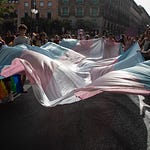[This blog will always be free to read, but it’s also how I pay my bills. If you have suggestions or feedback on how I can earn your paid subscription, shoot me an email: cmclymer@gmail.com. And if this is too big of a commitment, I’m always thankful for a simple cup of coffee.]
I’ve had a nagging feeling over the past several years that there’s an important aspect to evangelical church culture in the United States that’s been consistently overlooked, or simply unknown to most of the public.
I was a senior in high school when I became a Christian, and while I was certainly primarily motivated by Christ’s teachings, there was another factor that played an enormous role in keeping me going to church: the warmth of community.
My family had been fractured and fraught all throughout childhood, so when I was invited by a friend to her church service, I was taken aback by the easy embrace of belonging there. I say that in the general sense, of course. Being queer, for example, was not-so-welcome. More on that in a second.
I was in that church for nine months prior to my enlistment in the Army, but when I arrived at my duty station in Washington, D.C., I eventually found myself attending another church on a friend’s invitation, which was also evangelical.
This was in 2006, and back then, the public’s understanding of political motivation behind predominantly-white evangelical congregations was not nearly as savvy as it is now. Being invited to that church didn’t carry with it immediate alarm bells. If anything, it felt like a welcome invitation.
I had been trying for a year to find community in D.C. because I certainly wasn’t gonna find it on base. The soldiers of my age and rank were far more interested in partying all the time, which is perfectly alright, but it just wasn’t my thing. I had a hard time finding human connection. I was lonely.
Walking into that D.C. church on the first Sunday was a balm. There was so much joy and excitement. I could tell that folks wanted to be there, and it didn’t take long to figure out why. There was a very strong familial vibe to it all, and it didn’t feel forced at all. Quite the opposite.
I was immediately greeted at the door. Throughout the service and afterward, so many folks I didn’t know came up to introduce themselves. They were kind and lovely. I would later learn this was simply the culture. New congregants were readily embraced and made to feel at home.
Before I knew it, I was spending all my time with folks in their 20s and 30s who attended the church. Being just 19—and thus, one of the younger folks in the group—I never felt pressured or put upon. I was just one of the gang. They quickly became my friends, and at long last, I found community. I found family.
I still keep in touch with many of those friends, and I certainly don’t regret that period in my life. Most of these folks were good people who simply loved Jesus and enjoyed spending time around others who felt the same. We all had friends outside the church, but that particular bond was (mostly) rock solid.
The problem came over time in ways that were unexpected and often jarring. Some people I met through the church would occasionally bring up, say, LGBTQ rights in not-so-kind ways. Same for abortion and other hot button issues.
They would offer unsolicited political opinions to me that, quite frankly, even then, at my relatively young age, felt half-baked at best and asinine at worst.
Gender roles were an ongoing theme. The pastors would often allude to the purpose of faithful men and faithful women. Men were supposed to be the leaders: in church, in family, in society. Women were supposed to lift up men.
This was all quite curious to me because our congregation had no shortage of women who were leaders outside the church: doctors, lawyers, military officers, Hill staffers, and a few academics. One woman in our church would eventually be elected to Congress.
And yet, it felt like we all constantly got the message from the pulpit that women should essentially defer to men in all areas of life. It would be couched in softer tones, but the thrust of that ideology was undeniable.
I recall a married couple inviting me to dinner at their home on the Hill. The husband was a former White House staffer, and the wife was an attorney. They both worked, but he explained to me that he made all the decisions for the direction of their family because that was God’s intention.
I was obviously closeted at the time, and his wife not only seemed perfectly at ease with the conversation but made a point in insisting to me that when I get married someday, I should understand that my godly responsibility is leading my future wife in all ways.
This accomplished lawyer told me she doesn’t make any decisions without her husband’s approval. She encouraged me to understand my future role in that regard.
To be abundantly clear, it didn’t work the other way around. They told me that her job was to advise him in their marriage but that he got the final say on everything. His relationship with God gave him a divinely-conferred authority to which, as a woman, she did not have access.
They were otherwise nice people, but that was the first night I recall feeling deeply uneasy. These were grown adults, and I still believe that what they consensually do in their own marriage is none of my business. But it was their insistence to a 19 year-old on what I should be doing that felt a bit off.
I think “grooming” is perhaps too strong a word, but looking back, it did feel more than a little inappropriate. It felt borderline manipulative. It felt like the dining room table at which we sat was within shouting distance of cultish behavior.
I would soon learn that this was pretty normal in the congregation: married couples telling young congregants what is and isn’t godly in marriage. And what their position should be on LGBTQ rights. And how they should feel about abortion. And any number of other things the far-right obsesses over.
I kept hanging out with friends in the church my own age, but I soon stopped accepting dinner invites to the homes of married couples. Something about it felt oddly orchestrated, like a pipeline in which lonely young people were taken under their wing and turned into God’s soldiers.
I was definitely a Democrat back then, and I wasn’t alone. There were a number of Democrats in our congregation, but they weren’t vocal, that’s for sure. They certainly weren’t as politically vocal as the Republicans, including all the pastors.
I realize a lot of folks reading this will say “and yet, you still stayed there,” but I promise you it’s not that simple.
Imagine you’re a young person away from home, especially a young person like myself without a healthy family to fall back on, and these wonderful people take you in and make you feel like one of their own—safe and welcome and worthy of love—and offer the warmth of family.
Try to imagine you’re a young person who has never been so loved, and suddenly, here are all these older folks who would do anything for you: help you find an apartment, coach you through a job application, take you out to dinner or a ball game, offer a personal loan.
Suddenly, you have loving parental figures for the first time in your life. How do you let that go? How do you reject their advice? How do you not seek their approval?
And meanwhile, even aside from that, you love your similarly-aged friends in church. You love being around them. They cheer you on, they show up when you need them, they make a point of being supportive. They’re simultaneously fun and grounding.
Yet at some point, I had to accept that my values were not compatible with this church, and I eventually left, which, I gotta tell y’all, was really hard. But what about the young person who, for whatever reason, can’t leave — perhaps afraid to lose that sense of family, despite misgivings?
Evangelical churches are exceptionally skilled at building loyal communities, and central to that dynamic is offering emotional nourishment to young people who are starved for a (mostly) judgement-free environment in which they receive the care and attention they’ve never had.
It’s not just young people. I knew plenty of older, unmarried adults—some without children, some with children—who seemed quite cemented in the social structure of the church, and I often wondered if they had anywhere else to go outside of it.
I’m not talking about older adults who are simply obsessed with their church community. That’s different. I’m talking about older adults who don’t have anything in the way of a support system outside their church community because they don’t know how to create one.
I believe loneliness is a highly effective driver of the evangelical movement.
In his book The Great Good Place (1989), the sociologist Ray Oldenburg popularized the concept of “the third place,” or spaces that most nourish us outside of home and work. Your home is your first place, work is your second place, and third places are all the other spaces that allow for creative human engagement.
Your third place is your book club, your recreational softball team, your local bar, maybe the park around the corner where you see friends regularly — all spaces which don’t have any explicit obligation to hold you but to which you voluntarily and regularly go for nourishing human interaction.
More and more Americans are now constantly online as their sole third place. This can be fine in moderation, of course, but do I really need to point out all the ways in which this could go very wrong? And often does?
The Surgeon General released a report last year that found about half of surveyed adults experienced “miserable levels of loneliness” even before the pandemic and that young people aged 15-24 had “70 percent less interaction with their friends” than American youth 20 years ago.
I often wonder how many folks in this country truly understand what it means to feel utterly lonely, unmoored and socially malnourished. And if folks who feel that way come across a community that does nourish them socially, can we really be surprised they make concessions to stay? Maybe you would?
I want to be clear: I am not suggesting that loneliness is to blame for the extremism coming out of pre-dominantly white evangelical circles. That’s absurd. What I’m saying is that there are absolutely vulnerable people who are driven into nonsense environments because that’s what’s readily available.
There are a lot of stranded, lonely folks looking for a community they can call home but no apparent way to get there.
If we’re not reaching out to them and offering a bridge they can cross into the light, how can we ever blame them for sticking with the dimly-lit haunts they’ve only ever known?












